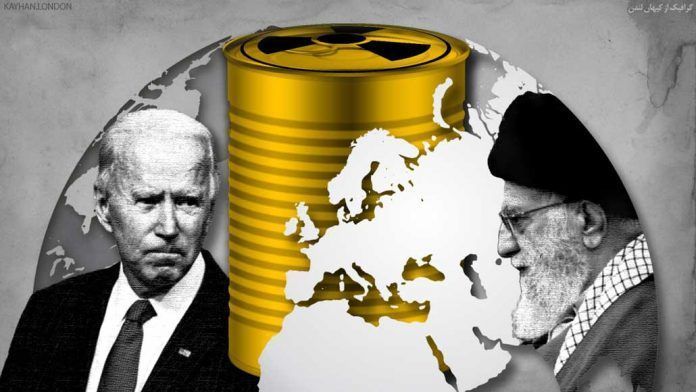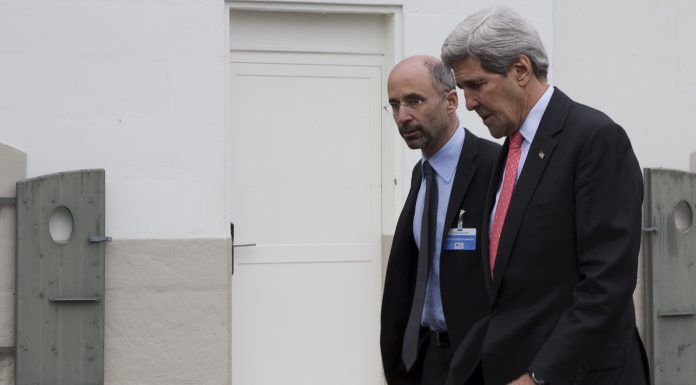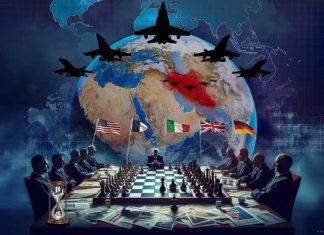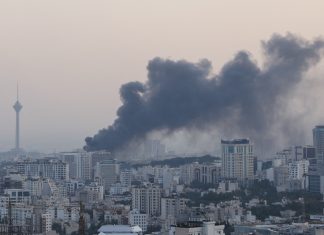By Ahmad Rafat
What will be the outcome of the Vienna talks aimed at rebooting the 2015 Joint Comprehensive Plan of Action (JCPOA), or Iran nuclear deal? That is the question that all participants are asking themselves.
Hossein Amir-Abdollahian, the newly appointed Foreign Minister in President Ebrahim Raisi’s cabinet, has said that Iran would need a two to a three-month extension to prepare for the new round of nuclear talks, which were scheduled to resume in early September.
[aesop_image img=”https://kayhanlife.com/wp-content/uploads/2021/08/2021-08-29T182235Z_1150194027_RC26FP90RCHH_RTRMADP_3_SYRIA-SECURITY-IRAN-scaled.jpg” panorama=”off” align=”center” lightbox=”off” captionsrc=”custom” caption=”Syria’s President Bashar al-Assad meets with Iran’s foreign minister, Hossein Amir Abdollahian, in Damascus, Syria. REUTERS./ ” captionposition=”left” revealfx=”off” overlay_revealfx=”off”]
However, Robert Malley, the U.S. Special Representative for Iran and the lead negotiator in the Vienna nuclear talks, has repeatedly said that the U.S. cannot wait forever for Iran to return to the negotiating table.
Meanwhile, European governments have been urging Iran to return to the negotiations as soon as possible. They have pinned their hopes on an upcoming visit to Vienna by the new head of the Atomic Energy Organization of Iran (AEOI), Mohammad Eslami, for the 64th General Conference of the International Atomic Energy Agency (IAEA) on Sept. 20-24.
The newly elected government has not announced which state organ will represent Iran in the nuclear talks. With the change of government in Iran, the Supreme National Security Council (SNSC), the AEOI, and the Iranian Foreign Ministry will spearhead the nuclear negotiations.
For the first time, three former members of the Islamic Revolutionary Guards Corps (IRGC) are presiding over these three bodies. They include Rear Admiral Upper Half Ali Shamkhani, the chairperson of the SNSC; Foreign Minister Amir-Abdollahian; and the director of AEOI Mohammad Eslami.
Does the fact that the heads of these agencies are men with military backgrounds signal a change in the Islamic Republic’s policies? That is another question that many are currently asking.
The U.S. negotiating team will also have a new member when it returns to Vienna for the sixth round of talks. Daniel Shapiro, the former U.S. ambassador to Israel from 2011 to 2017, will be the senior advisor to Robert Malley in the negotiations. Mr. Shapiro was appointed to the post shortly after a meeting between U.S. President Joe Biden and Israeli Prime Minister Naftali Bennett in Washington, D.C. on Aug. 29.
Including Shapiro — a “friend of Israel” — in the U.S. negotiating team in Vienna could be viewed as a win for Mr. Bennett. It is also possible that by appointing Shapiro, Mr. Biden is handing Bennett a “hollow” victory to defuse Israel’s concerns over America’s efforts to revive the JCPOA, which Israel vehemently opposes.
In his first meeting with President Raisi’s cabinet, Iran’s Supreme Leader Ayatollah Ali Khamenei did not list the rebooting of the JCPOA as one of the primary objectives of the new government. Mr. Khamenei believes that tackling the country’s economic problems, increasing cultural activities, and battling the pandemic should be the new cabinet’s top priorities.
Khamenei spoke about Iran’s foreign policy agenda and nuclear program at the meeting, warning that “diplomacy should not be influenced by or merged with the nuclear issue.”
Khamenei also attacked the U.S. and Europe.
“The current U.S. government does not differ from the previous one because it uses a distinct language to make the same nuclear demands as [former U.S. President Donald] Trump did,” Khamenei said.
Calling the U.S. “a pack of wild and savage wolves,” Khamenei did not spare European governments, either, saying: “The Europeans misbehaved and tried to derail everything much in the same way as the U.S. They are just like the U.S., except they also behave and speak as if we owe them something.”
Israeli intelligence sources view the delay in Vienna talks with suspicion. They believe that the Islamic Republic wants to have a “stronger hand” before returning to the negotiating table, enabling it to make new demands. This view is supported by Iran’s increased nuclear activities in recent months.
According to this view, the Islamic Republic plans to return to the Vienna talks when it is much closer to developing an atomic bomb, which will pose an additional threat to the U.S. and Europe, forcing them to make more concessions to Tehran. The appointment of Mohammad Eslami, who served in the IRGC and various nuclear facilities, should be viewed in this context.
President Biden, U.S. Secretary of State Antony Blinken, and Robert Malley have warned that the U.S. has other options if the Vienna talks cannot yield concrete results. This shows that Washington is worried that a protracted negotiation could bring Tehran one step closer to getting an atomic bomb.
Highlighting some of these options, Malley has hinted that Washington and Tehran may reach a different nuclear agreement than the JCPOA, adding that if Iran were to reject such a proposal, then the U.S. and its European allies may take punitive measures against the Islamic Republic.
The U.S. believes that Iran’s current economic crisis may ultimately force it to accept a more restrictive accord than the 2015 JCPOA. Meanwhile, many in Iran argue that the U.S. may remove the IRGC from its list of terrorist organizations and lift sanctions on the Islamic Republic’s leadership, given that President Biden does not want to get the U.S. involved in a new war in the region.
Quoting some Iranian sources, the Reuters news agency reported that besides seeking sanctions relief, Raisi’s government hopes the European signatories to the 2015 JCPOA would agree for Iran to continue to enrich uranium to 60 percent and operate its centrifuges.
That the U.S. does not want a new war in the region is widely known. Joe Biden also plans to prevent a direct conflict between Israel and Iran. He is trying to persuade Israel to limit its actions against Iran to airstrikes, drone and missile attacks in Syria, and sabotage operations inside Iran.
Although Biden has not opposed Israeli Prime Minister Naftali Bennett’s plan to form a coalition with the Gulf States against Iran, he aims to control these efforts.
The White House has transferred U.S.-Israeli military cooperation, which was previously part of the United States European Command (EUCOM), to the United States Central Command (CENTCOM), which operates in the Middle East. That gives the U.S. supervision over the Israeli military.
Meanwhile, Europe does not seem eager to work with Raisi and his government. In his recent trip to the region, German Foreign Minister Heiko Maas held talks over the Afghan crisis with Turkish, Tajik, Uzbek, Pakistani, and Qatari officials. However, he did not stop in Tehran.
ANALYSIS: Afghanistan Will Be the New Base of Operation for Iran and IRGC
Italian Foreign Minister Luigi Di Maio traveled to the region on Sept. 3. Although Italy and Iran are trading partners, Mr. Di Maio is not stopping in Tehran during his trip.
Europe is not eager to engage with the government of President Raisi, who was allegedly a member of the “death committee,” responsible for sentencing thousands of political prisoners to death in the 1980s.
Europe is also concerned with some of Raisi’s advisors, including Mohsen Rezaei, the Secretary of the Expediency Council, and members of his cabinet, including Interior Minister Ahmad Vahidi, who has reportedly been on Interpol’s wanted list since 2007 for his alleged role in the bombing of the Jewish community center in Buenos Aires, Argentina in July 1994.
Iran’s Government Has Taken Innocent Lives, Says US’s Former Iran Envoy Brian Hook
EXCLUSIVE – U.N. Expert Backs Probe into Iran’s 1988 Killings, Raisi’s Role







